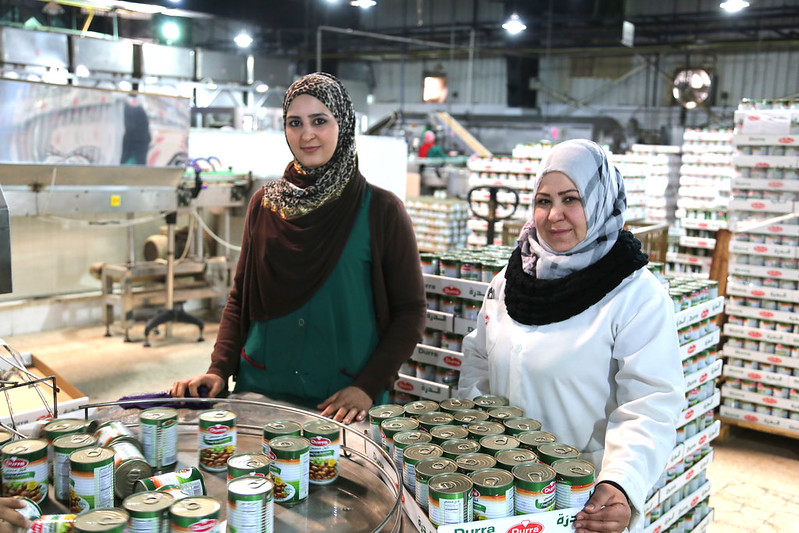Recommended

The vast majority of the world’s 26 million refugees face legal and practical barriers to economic inclusion. These barriers not only affect refugees’ self-reliance and wellbeing, but place significant stress on the overall economy. But, with full access to the labor market, they could contribute more to economic growth, while providing businesses with a larger labor pool and an increased number of suppliers.
The COVID-19 recession has exacerbated the need for economic inclusion to prevent the most vulnerable from falling into poverty and delaying economic recovery. For the private sector, helping refugees participate in the economy is not only the correct ethical choice, but one which will improve its bottom line.
What the Private Sector Gains
By hiring refugees, lobbying for simplified credentialing procedures, and supporting refugee-owned enterprises, the private sector can stimulate economic investment, encourage brand loyalty, and support growth necessary for a post-COVID recovery.
1. The human capital potential of refugees
While companies such as IKEA, Ben & Jerry’s, and H&M (to name a few) had already started hiring refugees before the pandemic, COVID-19 has opened up new opportunities. In multiple areas, from the health sector to agriculture, food retail, logistics, and cleaning services, the pandemic has worsened labor shortages and increased the demand for skilled workers.
Refugees are an untapped resource; in addition to filling gaps where needed, they bring a wide range of skills, experience, and qualifications to the market.
But for refugees to realize their potential, barriers need to be lifted. For instance, governments should recognize refugee’s qualifications and accredit their degrees. In the US, there are approximately 263,000 immigrants and refugees with degrees in health-related fields who are currently out of work or employed in “survival jobs” because they have no access to their profession. This is a substantial loss at any time, but especially so during COVID-19. If refugees could start occupying positions commensurate with their qualifications, they would become a significant asset for any business.
For refugees to realize their potential, barriers need to be lifted
The private sector should therefore continue to hire refugees and lobby for expedited accreditation of degrees and simplified recognition of skills. In the short-run, this will help the private sector fill labor shortages, thus allowing companies to continue, perhaps even increase, production—especially necessary for a post-COVID recovery. In the long-run, by investing in human capital, the private sector will gain access to a considerably larger talent pool.
2. Sustainable and resilient supply chains
In low- and middle-income countries, refugees are 60 percent more likely than host populations to be working in sectors highly impacted by the pandemic, such as accommodation and food services, manufacturing, and retail. As an example, a survey by Business for Goals in Turkey has revealed Syrian-owned businesses were more severely impacted by COVID-19 and are less prepared to face a second surge of the virus. If refugee-owned enterprises collapse, it could impact the supply chain of global businesses. H&M, for instance, engages Turkish businesses employing about 500 refugees in its supply chain.
COVID-19 has exposed the importance of building resilient, sustainable supply chains. To do this, the private sector should lobby governments to allow and / or facilitate refugees’ access to work and business permits. With the right resources and regulations, these enterprises could expand, hire more refugees and locals, and become resilient suppliers for global businesses. These global businesses would benefit from the stability of the supply chain and an enlarged number of businesses to source from.
3. Increased brand loyalty
The majority (60 percent) of consumers buy a product because of a company’s reputation, rather than their perception of the product. Hiring, partnering, and sourcing from refugees is one way to build comparative advantage. A 2019 study conducted by the Tent Partnership for Refugees and New York University’s Stern School of Business showed 44 percent of consumers in Italy, France, and Germany preferred to buy their products and services from companies employing and supporting refugees. This increased to 77 percent among millennials.
If anything, COVID-19 has increased consumers’ awareness of how businesses engage with social issues; their conduct during the pandemic will likely affect their reputation after the crisis. This is therefore a strategic moment for companies to build their reputation—involving refugees in their business could be an effective way to do so.
Existing momentum in the private sector
The private sector was aware of the importance of refugees’ economic inclusion before COVID-19. Some examples of private sector engagement include the Tent Partnership for Refugees’ network of over 130 major businesses open to including refugees in their business operations, supporting refugee entrepreneurs, and tailoring products to better reach refugees. Another is the new Private Sector 4 Refugees, formed by the World Bank Group in 2019, when the Confederation of Danish Industry, and the European Investment Bank, got together to discuss the “Role of the Private Sector in Economic Integration of Refugees.”
Unsurprisingly, the current global recession, rising unemployment rates, and increasing xenophobia and racism have made it more difficult to argue for refugees’ economic inclusion. But history shows us that expanding the labor market to all can help countries recover from recessions and spur innovation.
History shows us that expanding the labor market to all can help countries recover from recessions and spur innovation
Fortunately, new initiatives continue to emerge. The COVID-19 Private Sector Global Facility, for instance, is a collaboration between the private and the public sector aiming to foster a recovery based on economic inclusion. While still in its nascent stage, initiatives like this one are key in ensuring momentum is not lost.
The private sector has much to gain from hiring refugees, sourcing from refugee-owned businesses, and including them in their supply chains. COVID-19 represents an opportunity for a new beginning, one which should see the private sector increasingly advocating for and also benefiting from refugees’ economic inclusion.
Disclaimer
CGD blog posts reflect the views of the authors, drawing on prior research and experience in their areas of expertise. CGD is a nonpartisan, independent organization and does not take institutional positions.
Image credit for social media/web: UN Women/Christopher Herwig





